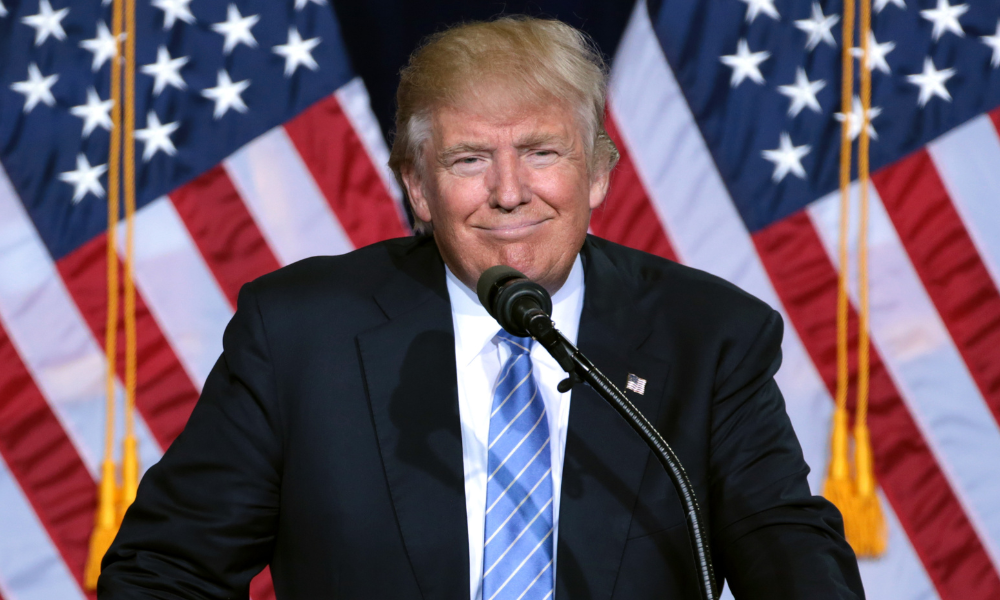The president-elect's bombshell threat sent the loonie plunging – but how serious is he about tariffs, and what could they mean for the Canadian economy?

Photo: Gage Skidmore, CC BY-SA 3.0, via Wikimedia Commons
The Canadian dollar plummeted following US president-elect Donald Trump’s pledge on Monday to slap a 25% tariff on all goods crossing the border from Canada when he takes office in January. But as speculation grows about the potential havoc the move could wreak on the Canadian economy, analysts are also weighing up the question of how realistic Trump’s threat is.
Trump – whose second term in the White House begins on January 20 – fired off the announcement in a Truth Social post on Monday evening, warning he would introduce a blanket levy on Canadian goods as one of his first executive orders if Canada failed to clamp down on cross-border fentanyl trafficking and illegal immigration into the US.
The threat roiled markets and left Canadian government officials scrambling to issue a response, although Bank of Montreal (BMO) senior economist Robert Kavcic believes it could be little more than “early posturing” by Trump in an effort to spur stricter border control on the Canada side.
With nearly two months until Trump’s inauguration, Kavcic said the extent of potential damage to the Canadian economy would be determined only when the size and coverage of the tariffs, if implemented, became clear.
Canadian Imperial Bank of Commerce (CIBC) World Markets chief economist Avery Shenfeld, meanwhile, said border and drug enforcement agencies could be jolted into action by Trump’s missive – but the “much feared, permanent imposition of across-the-board tariffs” remained an unlikely prospect for now.
He questioned whether the president-elect would ultimately follow through on his threats in January. “Given the damage that such tariffs would inflict, particularly on Canada and Mexico given their close trade ties with the US, the announcement looks like a move to get action on border issues and then declare a policy win for the president,” Shenfeld wrote, “rather than as the first iteration of the administration’s trade policy.”
PM Trudeau tells reporters re: phone call with incoming U.S. President Donald Trump after threat to impose 25% tariffs on products from Canada & Mexico: "It was a good call. This is something that we can do, laying out the facts, moving forward in constructive ways."
— CPAC (@CPAC_TV) November 26, 2024
#cdnpoli pic.twitter.com/GeJJK0Xrnx
Could Trump’s tariffs crash the Canadian housing market?
If implemented, the measure could dent Canadian economic growth prospects for 2025 and throw into question the Bank of Canada’s current inclination towards cutting interest rates.
That would have a big impact on the housing and mortgage markets north of the border in the coming 12 months. Still, with little clarity on whether tariffs will indeed come into effect in January, Shubha Dasgupta (pictured below), chief executive officer and co-founder of mortgage brokerage Pineapple, told Canadian Mortgage Professional he was taking a measured view of the news.

“So far, it’s not negatively impacting our outlook for next year,” he said. “We’ve always taken a conservative approach at the beginning of these cycles. Typically, as we lean into those new economic or housing cycles, we don’t expect significant, robust growth.
“We expect steady appreciation and steady growth activity. We’ve taken the approach that we’re going to start seeing a lot of the demand that’s been sidelined come back into the market. We’ll begin to see consumer sentiment normalize and back to a more sustainable level of activity. We’re not forecasting exceptional growth next year, but we’re forecasting consistent progress – and based on what’s happening in the US, we don’t think it conflicts with our projections.”
With the US accounting for about 75% of all Canadian goods exports, full implementation of Trump’s proposed tariffs – a worst-case scenario at present – could prove a s sizable stumbling block to a hoped-for housing and mortgage market recovery in 2025, according to Ron Swift (pictured below), chief executive officer at Toronto-headquartered lender Radius Financial.

“This could be a significant setback for people buying houses if they don’t have a job next year because it’s affected their company and there’s laying off of people because costs of goods have gotten too expensive and the US aren’t buying their goods as much,” Swift told CMP.
He outlined an important few weeks ahead for diplomatic outreach from Canada to Trump’s team to stave off the prospect of the situation unravelling further. “I’m hoping that as we work through some of these issues with the US and some of the demands they’re looking for, there are going to be ways that we can manage this,” he said.
“Hopefully they’re on the phone now trying to work with them so that it won’t come across and it won’t be 25% on all goods and services from Canada – and there’ll be some kind of compromise that makes sense for us and the US going forward so that it won’t have this huge impact on us.”
What else is in store for Canada’s economy with Trump back in power?
The furore brings into sharp focus some of the challenges facing Canada as a second Trump era in Washington looms, with some observers viewing the incoming president’s policy slate as one that could pose upside risk to inflation.
Michel Durand (pictured below), chief executive officer at the MCommercial mortgage brokerage, told CMP that an inflation uptick south of the border could also force the Bank of Canada’s hand in changing its approach to its own overnight rate.

“If [Trump] does create inflation in the States, the US will need to consider increasing interest rates,” he said. “If they decide to start increasing their rate to stave off inflation, that’s going to affect us.”
The Bank of Canada has slashed rates in each of its last four announcements, a run Durand credited with improving prospects in certain segments of the commercial mortgage market. But that could be short-lived if it’s forced to start hiking again. “The little progress that we’ve seen on the commercial side by rates easing up has allowed [especially] multi-unit residential projects to start pencilling out better. Some of those are coming back to the market,” he said.
“But if the rate reductions stop, all of a sudden that nice roll that we were on also stops. So we’re going to have to wait and see what Trump ends up doing and how it affects our market.”
Make sure to get all the latest news to your inbox on Canada’s mortgage and housing markets by signing up for our free daily newsletter here.



